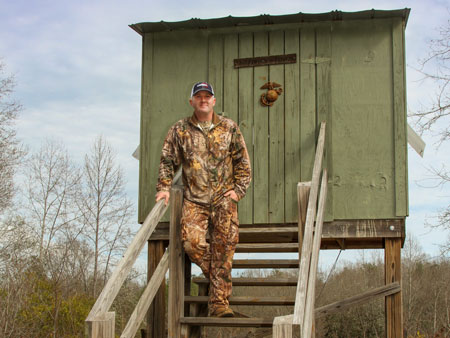Hope In The Hunt: AHERO Farm Heals Veterans Through Hunting

Marine Corps Maj. Lee Stuckey of Macon County is an American hero. But he almost became a statistic.
After 12 years of service and his third combat deployment to Iraq, the wounded veteran struggled to find a reason to live. One night, he put the end of a loaded Glock in his mouth. The only thing that stopped him from pulling the trigger — a phone call from his mom at just the right time.
“I didn’t want to tell anyone I was going through issues or struggling; I see myself as an alpha male,” Stuckey said. “That night, my mom saved my life. I started getting therapy and realized I was an OK person dealing with abnormal issues.”
Stuckey wasn’t alone. According to a 2016 Veterans Affairs Report, an average of 20 U.S. veterans take their own lives every day. In one year, the U.S. loses over 7,000 veterans to suicide — more than the American casualties in the wars in Iraq and Afghanistan.
His second chance gave Stuckey a second calling.
“I want to save others from taking their own lives,” he said. “I wanted to tell other veterans that I almost made a permanent decision and it would have been a bad one. I want to show them that the worst day on Earth is still a great day.”
The only question remaining was “How?”
His answer came at a Buckmasters event in Montgomery — invite veterans to group hunts on his Macon County land. In two weeks, Stuckey signed up 65 veterans for the first hunt. He knew he’d found something that would work.
In 2011, he created AHERO, which stands for America’s Heroes Enjoying Recreation Outdoors. Over 1,000 veterans have participated in various AHERO hunts in six years.
While veterans come for the hunt, Stuckey said they build a brotherhood that gives them purpose and helps fight post-traumatic stress disorder (PTSD) and suicidal thoughts.
“At the AHERO Farm on my land, we call it screen porch therapy when we have guys who will be in history books just open up and share their stories,” Stuckey said. “The community in Shorter has opened their arms and embraced these hunts. Many of them see it as their way to serve America — by serving those veterans who served them.”
Community support is fundamental to AHERO’s mission. Stuckey remains on active duty and is stationed out of state. His father, Al, works to maintain the farm. Recently, students from Wetumpka High School FFA visited to help maintain the land.
Donations are also vital, because veterans pay nothing for the trip. Local restaurants donate food, women’s groups from Macon County churches provide desserts, and Shana’s Place has processed over 100 deer at no cost. Airfare and lodging are covered by generous donors, including Macon County homebuilder Kirby Caddell, who opens his home to veterans during hunts.
“We owe these guys our lives,” Caddell said. “We owe them our freedom. We need to offer something back to them. It wouldn’t be American if we didn’t. When they come in, they are going to become a part of the family. That’s just part of the deal. When they leave, I hope they have a good feeling about themselves and know that when they need somebody, all they have to do is call.”
The five AHERO board members are also volunteers.
“In some respects it’s selfish that I do this because it helps make me a better person to be exposed to all these amazing American heroes,” said Lex McMahon, AHERO board member and U.S. Marine corporal. “We facilitate bringing these warriors together for hunts, but it’s really so they can engage in peer-to-peer therapy. They open up to one another, and they start to heal. It’s very cathartic and therapeutic.”
To provide that healing to more veterans, Stuckey is fundraising to build a pavilion at AHERO farm. It would replace the current building, which can only house about 10 people.
The $300,000 project would sleep 34 veterans in an ADA-compliant pavilion with a veterans resource center and gym.
“This building will give us the ability to heal people in one spot,” Stuckey said. “Aside from lodging, we’ll have additional rooms where we can talk about things like proper nutrition and how to build resumes.”
The pavilion will be named after Marine Maj. Gen. James Livingston, an Auburn University graduate and Medal of Honor recipient.
Stuckey said the building is the next step in saving more veterans from making a bad, permanent decision.
“The goal is not to take these veterans hunting,” he said. “It’s to increase their quality of life. It’s to make sure that when they go back home, they know that there’s hope. That’s what it’s about. The hunt is just the bonus.”
Visit AHEROUSA.com for more information or to make a contribution to the AHERO Pavilion project.
